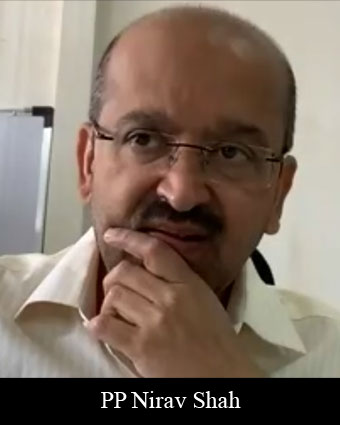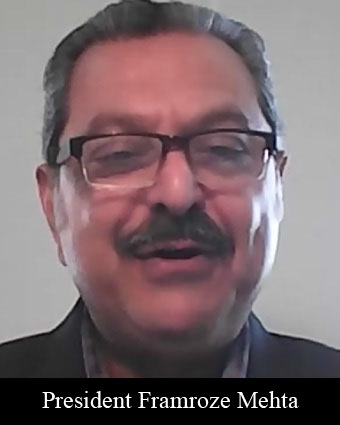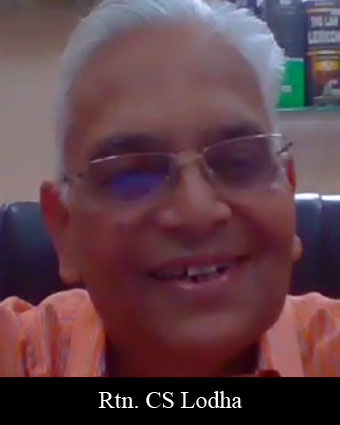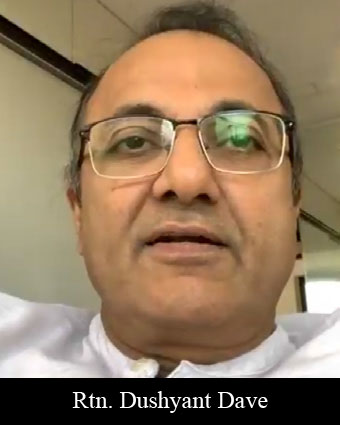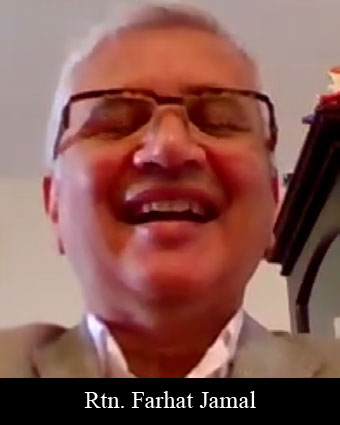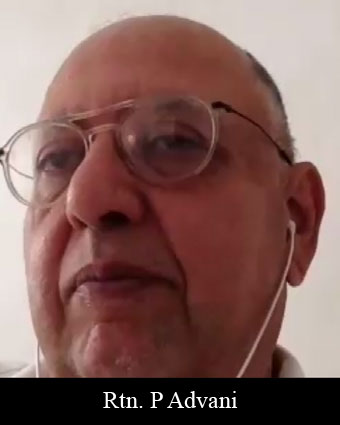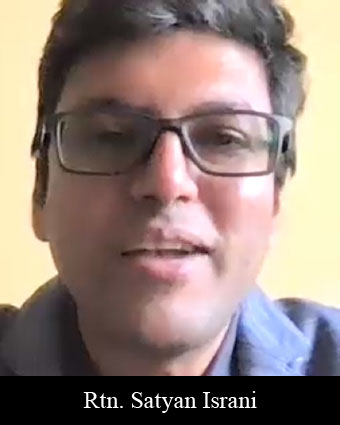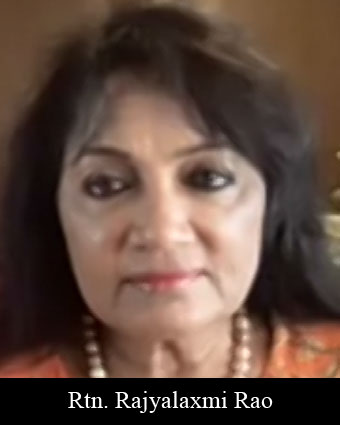
Discussing The Budget: PP Shailesh Haribhakti & RTN. Anil Harish
PP SHAILESH HARIBHAKTI:
It was very thoughtful of you to have given us the topic of reflections of the Budget because I think we have allowed a sufficient amount of time to be spent in truly doing that. So, I am going to talk to all of you about the 3 hundred-billion-dollar idea which I see being reflected in this budget. The first hundredbillion- dollar idea is the capital expenditure that will happen in India, the budget provision itself calls for 554 thousand crores of capex and to that the capex which is to be incentivized at state levels at another 2-2.4 lakh crores there. But the biggest filler will come as clever and committed ministers like Mr. Nitin Gadkari and Piyush Goel actually capture the value from completed capital expenditure projects like performing Highways. Just imagine that you put a major performing highway into an Infrastructure Investment Trust (InvIT) and invite global and domestic participation in it, the monetization of that asset is going to be in Nitin Gadkari’s own word, he has a stock of 9 lakh crores InvItable, in terms of completed infrastructure projects which are already annuitize with fast tag and all that automation and digitalization and therefore there is a real possibility that this 100 billion dollar idea will actually happen right before our eyes in the next 12 months.
The second 100-billion-dollar idea is FDI. Already we are at the runrate of something like 5 billion dollars a month, to boost that up to 7.5-8 billion dollars a month is not going to take much largely because number one, there is no place on earth, absolutely no space which has the same potential for profitably investing in infrastructure. We are short of infrastructure everywhere, whether it is highways, ports, airports, roads, almost every aspect, but the biggest lack or the biggest potential is in health and education. Transformational investments can be made and will be made through FDI and my conviction is that this year we will break all the previous records and touch the 100 billion dollars in FDI in India.
The third is this whole idea of getting out of the business, more governance, less government. We have a commitment in the budget for a 175 thousand crores of privatization, disinvestment. But that does not include the IPO of LIC for example, the IPO of LIC will itself, even at 10% will result in a 110 thousand crore at 11 lakh crore valuation. But given the fact that 7 PSUs are already listed for total divestment and we have seen that very fleet footed Mr. Anil Agarwal establishing a 10-million-dollar fund internationally to facilitate the buy out of public sector undertakings, if he can do it, several others might and shall do it. And I can tell you from personal experience that the excitement and interest in buying out PSUs like Shipping Corporation of India, Bharat Petroleum, some of these majors and many others is really phenomenal. To get a term sheet for that or an expression of interest for bidding for these public sectors acquisition in simple because there is going to be a complete clamour for this because we have seen how quickly and rapidly there can be tuned around and so, I see India gaining leadership because not only the Centre PSUs but the State PSUs, the monetization of the assets, the whole investment process, all of that will result in a third 100-billion-dollar opportunity.
I will now talk about 5 big innovations, we can look forward in India to energy, independence and energy abundance. India can be the 1st country in the world which can aspire to energy abundance. What is mentioned in the budget is clean Hydrogen. This technology in the budget has been in the works for a long time. Earlier Hydrogen was extracted from methane in a very dirty, polluting process, now through solar thermal and through the extraction of hydrogen from water through electrolysis, is a technology that has been perfected and if we are able to extract and store it by using the abundant energy that gets produced when you are actually at it, and then use it when it is required, you can have energy abundance at the lowest unit cost of any given energy that the human kind had known. The cost per unit of hydrogen as source of energy will be lower than the cost per unit of solar and the cost per unit of solar is already lower than coal. So, coal is dead in any case. So, there is this amazing citing of clean hydrogen in the budget and as a means to energy abundance and once the cost of energy comes down, the entire economic performance of India can be transformed dramatically.
The second thing is vehicle scrapping. This is useful not only to only to make sure the wheels of automobile industry keep rolling as they must and as they are. Today morning I was talking to Eicher Motors, and they were telling me, they simply have to meet the demand, they don’t have to raise the capacity, the same conversations are going on in M & M and all other automobile factories. But look at the sharpness of this insightful announcement. What it is indicated is that none of us should get ready to buy an internal combustion engine automobile. We should all wait for the next EV vehicle and that is going to be possible for each and every one. I am committing right here in front of all of you that I will never buy another internal combustion automobile, my next vehicle will be an EV. So, even for that, this whole policy is an incredible way to make innovation.
The third innovation is ship breaking at scale, we already have a large ship breaking enterprise going on and the idea in this budget is to raise decent work for our population which is the center piece of our budget. If you put 100 billion dollars into an infrastructure, you create jobs. You bring in ship wrecking, you bring in jobs, you bring in all the manufacturing, you bring jobs. Therefore, the center-piece of the budget is to create decent work for our people.
The fourth innovation is to move away a big pillar from tax filing and tax assessment to tax determination. India is becoming fortunately, one of the most data rich countries in the world. We are collecting data at a furious space. We will be the first country to be actually able to utilize that gigantic power of quantum computing and look at the foresight of our government, for the first time India has found the path to actually manufacture semi-conductors in India. So, CII is helping to put this together and Indian industry is coming together under one umbrella to actually put up two Fabs, digital and analogue Fabs to make computer chips in India.
Now how does tax determination work? It works because of the financial footprints. They have already said that those who have income only from interest and pension and are above the age of 75 need not file a return. But that can move down to all other category of income which are trackable and which can be used for tax determination. So, that is an ongoing process which will only get momentum with faceless everything.
And the final big innovation is the one person company innovation, to support startups not only in India but all over the world. This is a unique proposition. I have never seen Company Law being amended through budget. It is incredible that you are now giving a limited liability cover to massive innovators from anywhere in the world or come and set up one-person limited liability company in India. These are the 5 massive innovations that I found through my reflections.
We already know the six pillars around which this budget is built, health, education, PLIs, infrastructure, agriculture and basic services. India is the first country which without calling it that is moving towards a universal basic income and service and it will be absolutely globe shattering when we actually reach there, with energy abundance, agricultural abundance, it is an amazing set of things that have happened. There are powers that are let lose over there in agricultural. So, what are the actions that are indicated to all of us? We all need to pivot and support the pivot, from seeking a job to becoming an entrepreneur. Very clear signal that has come from the budget and we need to completely diversify our portfolios.
Let me cover the indirect taxes and very interesting amendments made to the GST law. One of the entities that will be affected is our own club because they have made it clear that the club is different from all of us as members and if a member receives services then its supply of service is subject to GST. The other thing is, it has made it very difficult for people to raise fake invoices, very severe amendments have been made for fake invoices and claiming fictitious IDs. For both of that not only you will be levied a fine and a penalty but the personal assets of everybody involved in it including directors, auditors, lawyers and who ever is involved in this activity of facilitating fictitious invoices and IDs, can be taken away by the government. So, the signal is very strong, you can’t do so.
They have data and they have proven that, you can’t have fake invoices, can’t make any more fictitious IDs. Mr Lodha will confirm that these amendments are very significant in terms of making sure that tax buoyancy and compliance will be what will get us the numbers that have been budgeted, 22 lakh crores to be raised in taxes, I think it is more or less a certainty, conservation of GDP.
On customs, 400 completely silly old times exemptions are being removed and they very cleverly levied further customs duty on things which needs protection where Indian Manufacturing is to be supported and they have reduced the customs duty on items which the Indian consumer was suffering. And so, there has been an excellent balance in the customs levies through this budget.
I’ll stop there and allow you to reflect that this is the budget that gives us phenomenal positive signals, I never imagined that we will have a 51000 SENSEX level, nor did I imagine that we will have a 15100 NIFTY, but I can see that it is fully deserved. So, I will stop here and leave it to you to reflect further how we could benefit from this extra ordinary budgets. To me it compares almost equally to the 1991 budget which launched India to a high growth path.
RTN. ANIL HARISH
The topic on reflections on budget is very important because we have been hearing about the budget ad infintum and almost ad nauseam as well. So, it is time to step back and see what are our reflections. So, lets begin from the beginning. Article 112(1) of the Constitution of India says that The President shall in respect of every financial year cause to be laid before both the Houses of Parliament a statement of the estimated receipts and expenditure of the Government of India for that year, in this Part referred to as the annual financial statement – so, it is therefore to be primarily an allocation of resources that is to be presented before the houses of Parliament and along with this the amendments to the tax laws are made. Now these are all forward looking statements which are mandated by the constitution. Although in the context of listed companies, forward looking statements have to be clearly described as such and even are frowned upon but I wish the pattern could change instead of how much money will be spent, we should have AGM of the Government of India and each of the Ministries of the Government. They should inform us about what has been done, what they plan to do and what they have actually done in terms of finances and in terms of actual activities that have been carried out. For instance, they should say how actual figures have panned out as against the budget, how the Nirbhaya fund money has been used, misused or not used because 85% of the money has not been used so far. This is what the allegations have come to me, I wish each minister could set out his/her plan of action, not just in terms of finances or revenue terms but in terms of qualitative terms – what is the health or education ministry doing? What are they going to do? There are so many things, what we need is accountability not mere figures. We want every minister in the cabinet to throw their hats and say this is what I am going to do and next year to say this is what I actually did as compared to what I had suggested.
This year there is a big plan for disinvestment and it is necessary, Sir Harold Wilson said, the treasury could not without success with the treasury could not with any success run a fish and chips shop. Which is true. The business of government is not to carry on business, the business of government is to govern. The government wants one lakh seventy-five thousand crores of rupees this year and one of the enterprises that they want to disinvest is Air India. But haven’t we heard that before? Well it was in the speech of budget 2019, it was in budget 2020 and it was also in the budget speech of 2001 – 20 years ago. Truly as it is said, in India anyone who has patience loses it and anyone who doesn’t have patience learns it.
There is also talk of disinvestment of 2 public sector banks and on the other hand they said that the existing public banks are to be recapitalized to the extent of 20 thousand crores of rupees. So, you will give away some banks and put in more money in the existing ones. Do the existing ones need money? If so, are they so, efficient? If, then why are you putting money? So, I think these things have to be thought about carefully. We can only hope and pray that whatever the government plans to do gets implemented and what it does it be well for the country.
Another part of the budget is the tax proposals. The Finance secretary of the country, Ajay Bhushan Pande said that there is a need to step out of the mindset to tinker with tax rates in every budget and that tax stability will be achieved by keeping rates unchanged. Yes, he is very right but although that is a good sentiment, shouldn’t it be applied to the provisions of law as well? Do you know that in 2 years and one day from 1st February 2019 there were 86 clauses in the finance bills of 2019 proposal to amend the IT Act, there was Finance bill no 2 which had 67 amends of the IT Act, then there was 2019 Taxation Laws Amendment act which had 8 clauses, in 2020 there were 103 clauses in Financial bill to amend the IT Act, in 2020 there was another law or relaxation of taxes in lockdown which had about 40 laws and now the 2021 bill has 78 clauses. Therefore, in these 2 years and 1 day we had as many as 382 proposed amends to IT Act and we are supposed to keep track of all of this.
Section 80 IPA allows for the tax exemption for those who are engaged in the business of constructing small and affordable housing the cost of which is upto 45 lakhs. Now originally it was said that if the plans were approved between 1st June 2016 and 31st March 2020, then the developer, subject to many other conditions, will get a tax exemption. This was extended to 20221 2021 and now in this budget the time for getting plans approved will be 31st March and the project has to be completed within 5 years thereafter. It is good, but have we resolved the housing problem for the country? No! It is not going to happen. We know so many of them live in slums, there has to be proper incentives given. For rental housing also there is going to be an extension by a year. The interest that a person takes on affordable house, again the extension will be granted by one year.
There is another provision Section 43(C)A which is important for all of us in different context as well. It provides that in the event where the property is sold at less than a reckoner value, this difference is sought to be brought under tax in the hands of the seller under Section 43(C)A and the buyer under Section 56 of IT Act. They have introduced a safe harbor and they are extending it. So, now they say, for instance if you buy a flat from the builder for 1 crore and the reckoner value is upto 120 lakhs then this difference will not be taxed at the hands of the seller or in hands of the buyer but it is going to be a safe harbor. However, if the transaction price is one crore rupees and the reckoner value is 1 crore 25 lakhs then you are out of the safe harbor and the builder will have to pay tax on this with reference to 1 crore 25 lakhs and you as a buyer will have to pay tax on these 25 lakhs which is a discount in reference to the reckoner price. So, this is a good thing but it is only for flats upto 2 crores rupees and for some strange reason it has come in effect from 12th November 2020 upto 30th June 2021.
Then let’s talk about senior citizens, they will be exempted from filing a return, they will not be exempted from tax, but from filing a return provided they have a pension income and interest income only from certain specified banks. Not from any nationalized of scheduled banks but only certain specified banks. But a person can’t keep all the eggs in one basket. Yet if the person is giving given interest from 2 banks, then he will not qualify and they will still have to file its returns. In any event the person will have to file a declaration with the bank. Some years ago the IT returns were called as Saral, now they don’t have names, they have numbers but if they had name, each one would have been called as Kathin.
Section 206 (A)(B) is to be introduced which will provide TDS at a higher rate. But the rate of tax will be twice the normal rate or 5 % whichever is higher if the person to who you are paying has not filed a return for the last 2 years. Now lets see this in context of section 194 (Q) of IT Act which is sought to be amended. It says that if you have a business of more than 10 crores turnover and if you buy goods for more than 50 lakhs from one supplier during that year, then there will be a TDS of 0.1% on the excess of such purchases over 50 lakh of rupees. So, this in conjunction to 206 (A)(B), you will have to ___ TATA Steel to show their tax return, because until then you would not know if they have filled their tax return. If they don’t give the copy of tax return, I’ll have to deduct tax under 206(A)(B) at 5% of amount. So, please look into all these aspects very carefully.
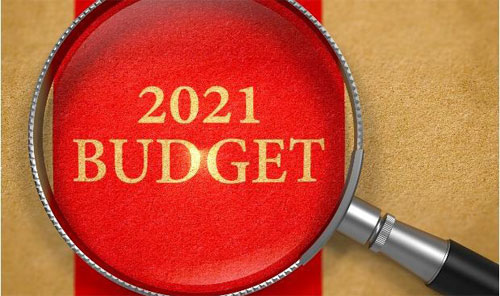 Section 45 (4) says that when a person retires from a firm and receives money or capital assets, there can be a tax liability. Section 234 (C) provides for advance tax. There is a good benefit, if you get a dividend income, you will not be deemed to have known about this in the month of June and pay tax on that, you will now only have to pay after you give the dividend. There are going to be faceless assessments. Saying things personally does make it different, so, there are restrictions on the viability of these.
Section 45 (4) says that when a person retires from a firm and receives money or capital assets, there can be a tax liability. Section 234 (C) provides for advance tax. There is a good benefit, if you get a dividend income, you will not be deemed to have known about this in the month of June and pay tax on that, you will now only have to pay after you give the dividend. There are going to be faceless assessments. Saying things personally does make it different, so, there are restrictions on the viability of these.
So, there are some amends, I am glad that some things are have not been done, I am glad that there are no Covid tax but I also feel that something out ought to have been done in terms of taxation for individuals. With highest rate of taxation at 42 should come down, I think GST on tourism and real estate particularly where there is no input tax credit, these sectors of the economy have been just decimated in the last year and they needed some incentive.
I read an article which talked about the graphs of the development, sometimes there is a U-shaped curve, or V shaped curve and this talked about a K shaped graph, where there is a vertical and there are two arms of the vertical. One of the arms points up and other points down and it says this is what the budget and the economy has been doing that those who are rich, the upper arm, gets richer and those who are not actually become poorer. Well, we have to take the budget as it comes, we have to get used to it.
ROTARIANS ASK
Do we have the management bandwidth to achieve the targets? Will the farmer protests be a road block in handling this?
I feel our government has super talent. I found them well-coordinated and well matched. We have been able to pull out talent to come to work for our country. The best example is Raghuram Rajan. I am very sanguine about the intelligent people up there who are formulating the surveys and budgets.
In terms of agricultural law, I think it is a misfortune that in every aspect where we want freedom, in this one is we want to stick to entitlement and status quo regardless of whether the rice and wheat we are growing is required or not. We must be allowed to produce and you must pay an increasing amount of support price. I think the biggest opportunity in agriculture is to switch oil seeds and pulses, cash crops and fruits. And I wish we get an objective picture of how these laws can help the farmers.
I think one of the mysteries of the budget is why tourism is ignored so hugely and there has been a drop in infrastructure developments and more money I allocated to the foreign tourism attraction which is not going to happen soon, a large amount should have been concentrated in the local tourism.
Full of sympathy with what you have said. I am very disappointed that they are not doing anything specifically for one of the biggest potential earners in Indian economy. We are beginning to increase in internal tourism and we need huge support for that. One of the big misses of the budget is that while they have facilitated the PSU disinvestments by making it easy for them to have clauses and all of that, they have not done it for MSMEs. Now lot of tour operators and other service providers will have to come together and for them to have this provision of offsets of depreciation and losses is very important. I am pushing for that wherever we can e to make tourism an activity that we would like to promote.
How ready you think India is to be included in the MSCI global index because if that was to happen, I think floodgates of inflow of money would come into Indian corporate bond market and the second thing, retailing of GSECs?
It is an institutional framework getting established for the net market at a rapid phase. There is a desire to have a net market. GSEC is a huge thing. The RBI had to cancel two options because the yields were going crazy. I can sense that this can be another 100-billion-dollar idea if put in place, looking at the potential and hopefully if we have a better framework, we will get there.


